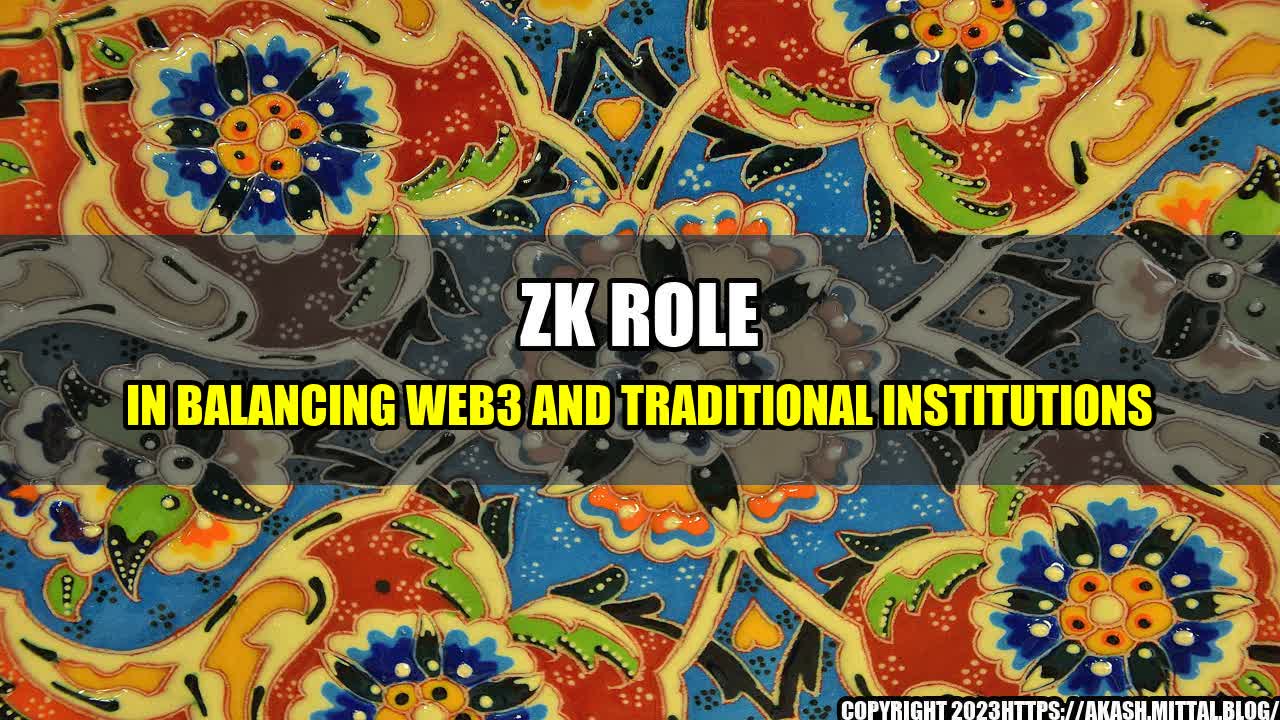The Role of ZK in Balancing Web3 and Traditional Institutions

When Sophie was young, she wanted to be a writer. She loved the freedom of being able to create her own stories, to share her imagination with others, and to inspire them. However, as she grew older, she realized that writing wasn't as simple as just putting words on paper. It involved a lot of research, fact-checking, and validation. It involved a lot of time and effort to make sure the information was accurate and reliable, especially when it came to topics that were controversial or sensitive.
Years later, Sophie became interested in blockchain technology and the potential it had to revolutionize industries and societies. She saw the benefits of decentralized systems, where trust was distributed among participants rather than concentrated in a single entity. She saw the potential for more transparent and secure transactions, for more inclusive financial services, and for more democratic decision-making processes.
However, Sophie also saw the challenges that blockchain faced in terms of adoption and integration with existing systems. She saw the cultural and regulatory barriers that traditional institutions posed to the decentralized ethos of Web3. She saw the skepticism and fear that many people had towards new technologies that they didn't fully understand.
This is where ZK comes into play. Zero-knowledge proofs (ZKP) are a cryptographic tool that allows for the verification of a statement or a claim without revealing any underlying information. This means that ZK can provide privacy, security, and scalability to blockchain-based systems without compromising the integrity of the data or the consensus mechanism.
ZK Applications in Web3 and Traditional Institutions
Let's look at some real-world examples of ZK applications that demonstrate its potential in balancing Web3 and traditional institutions:
- Privacy-Preserving Elections: ZK can be used to ensure the anonymity, fairness, and accuracy of online elections, without revealing who voted for whom. For example, in the 2019 Spanish national elections, the Partido Popular used a ZK-based voting system to select its new leader, which resulted in a more efficient and trustworthy process.
- Digital Identity: ZK can be used to create secure and verifiable digital identity solutions, which are essential for Web3 applications. For example, in the Bank of France's experiments with CBDCs, ZK-based self-sovereign identity (SSI) was used to ensure that the central bank could authenticate users without storing their personal information.
- Supply Chain Transparency: ZK can be used to provide end-to-end verifiability for supply chain management, which is important for traditional businesses that want to improve their sustainability and reduce their reputational risks. For example, in the Circular Carbon Network's pilot project, ZK-based tracking and tracing was used to ensure that the carbon credits were legitimate and accounted for.
- Data Monetization: ZK can be used to enable data privacy and ownership for individuals, while allowing them to monetize their data in a fair and transparent manner. For example, in Ocean Protocol's data marketplace, ZK-based data tokens were used to allow data providers to share their data with data consumers, without revealing the underlying data itself.
Conclusion
So, what can we conclude from ZK's role in balancing Web3 and traditional institutions?
- ZK can provide a bridge between the decentralized ethos of Web3 and the cultural and regulatory barriers of traditional institutions.
- ZK can enable privacy, security, and scalability for blockchain-based systems, without compromising the integrity of the data or the consensus mechanism.
- ZK can unlock new possibilities for digital identity, supply chain management, data monetization, and other use cases for Web3 and traditional institutions.
As Sophie realized, writing is not just about telling stories, but also about verifying facts and evidence. Similarly, blockchain is not just about creating new systems, but also about proving their validity and trustworthiness. ZK can be a powerful tool for accomplishing this task, by enabling us to verify claims and statements without revealing any more information than necessary. By using ZK to balance Web3 and traditional institutions, we can create a more inclusive, fair, and prosperous future for everyone.
Curated by Team Akash.Mittal.Blog
Share on Twitter Share on LinkedIn